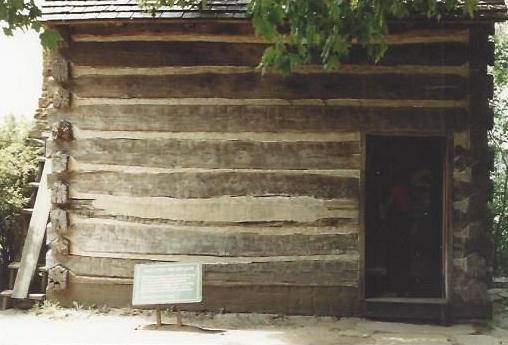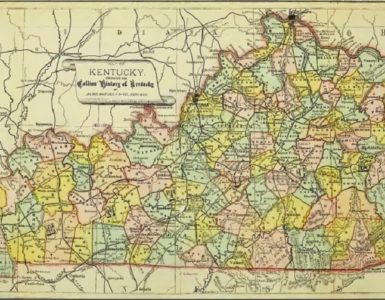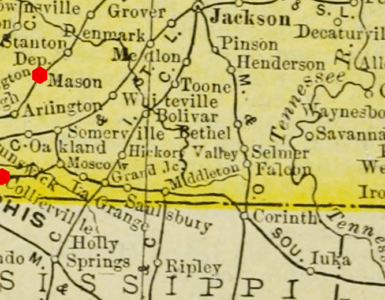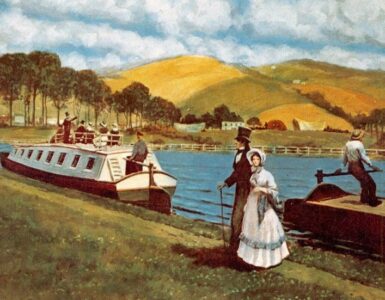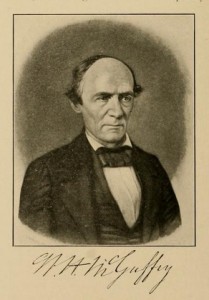 The cabin pictured in the header is currently in Greenfield Village of the Henry Ford Museum in Dearborn, Michigan, where it was relocated from its original site. It is a typical small pioneer cabin with simple notched interlocking squared-log construction, an entrance door of simple boards, and a large fireplace for heating and cooking. In this cabin was born to Alexander and Anna Holmes McGuffey in Washington County, Pennsylvania, September 23, 1800, a son they named William Holmes. The infant’s Scotch-Irish grandfather, William McGuffey, had emigrated from Scotland to America two years before the American Revolution and settled in the western part of the Quaker colony with his family. Alexander enjoyed the outdoors and became a frontiersman admired by his peers for his keen marksmanship. Alexander and Anna had married in 1794 and her father was Henry Holmes who was the owner of a large farm in the area. Young William Holmes McGuffey would grow up, as did so many of his generation, in a frontier cabin with all the challenges and pleasures of pioneer living.
The cabin pictured in the header is currently in Greenfield Village of the Henry Ford Museum in Dearborn, Michigan, where it was relocated from its original site. It is a typical small pioneer cabin with simple notched interlocking squared-log construction, an entrance door of simple boards, and a large fireplace for heating and cooking. In this cabin was born to Alexander and Anna Holmes McGuffey in Washington County, Pennsylvania, September 23, 1800, a son they named William Holmes. The infant’s Scotch-Irish grandfather, William McGuffey, had emigrated from Scotland to America two years before the American Revolution and settled in the western part of the Quaker colony with his family. Alexander enjoyed the outdoors and became a frontiersman admired by his peers for his keen marksmanship. Alexander and Anna had married in 1794 and her father was Henry Holmes who was the owner of a large farm in the area. Young William Holmes McGuffey would grow up, as did so many of his generation, in a frontier cabin with all the challenges and pleasures of pioneer living.
In 1802, the McGuffey family moved into the area that became the state of Ohio the following year. They settled near Youngstown on a homestead where William lived for sixteen years. His mother gave him instruction in the basics of education and he attended classes as he could in local schools. In his teens his parents sent him to Youngstown where he and his sister lodged with the Wick family. The McGuffey children were taught during the week by Pastor Wick of the Youngstown Presbyterian Church, but they returned home for the weekends. While he was a fourteen-year old studying in school he also taught school in order to earn money for his education. One particularly remarkable aspect of William’s intellect was an incredible gift for memorization. He memorized entire books of the Bible and whole works of classical literature. At the age of twenty one he could recite many of the books of the Bible in their entirety and repeat verbatim sermons that he had heard only once.
As he continued along his educational path, William studied with Thomas Hughes who was the pastor of Mt. Pleasant Presbyterian Church in Greersburg. As with many ministers, Pastor Hughes was one of the most educated individuals in the area and parents often sought ministers to teach their children. Hughes had built a log cabin on his lot in 1799 for his school, but the academy facilities were improved later when a proper building was constructed from funds authorized by presbytery and raised by Hughes. William McGuffey entered what became known as the Old Stone Academy in 1818 where he was prepared by Pastor Hughes to enter Washington College. McGuffey graduated college with honors in 1826. In between the sessions of classes at Washington he taught school in Kentucky for income to pay for his studies.
On March 29, 1826, William McGuffey was elected professor of Latin, Greek, and Hebrew by the Board of Trustees of Miami University, Oxford, Ohio. Miami had been chartered as a university in 1809 but the road to opening the doors had been a rocky one because classes did not begin until 1824. Along with his educational work, Professor McGuffey was licensed to preach by the Presbyterian Church in 1829. He had not formally studied theology, but as one might expect given his affinity for languages he had read the Old and New testaments in their original Hebrew and Greek at least twice. After about a year as a licentiate he was ordained by the Presbytery of Oxford, October 8, 1830, in the Bethel Church with his mentor, Thomas Hughes, preaching the sermon and Pastor R. H. Bishop delivering the charge to the congregation. McGuffey never held a regular pastoral call but while at Miami he delivered sermons regularly in local churches as a supply and often preached in the college chapel. He always spoke without notes and in later life often said that he had preached three thousand sermons but none of them were ever written. In 1832, William McGuffey became head of the Department of Mental Philosophy and Philology at Miami. During the McGuffey years at Miami the student body had nearly doubled by the end of his ten years of service in 1836. He is remembered today by the university with a museum in his campus home, and the university archives have a manuscript boxed collection and some selected resources available online.
Following the Miami years, William moved south about fifty miles to become the president of Cincinnati College. His new work was in an institution with faculties for medicine, law, and liberal arts that patterned its program after the curriculum of German universities. His work for Cincinnati College continued just a few years until 1839 when he accepted the offer to become president of Ohio University in Athens. His move about one-hundred-fifty miles east from Cincinnati would take him close to Virginia. He is still remembered today on the Ohio University campus with one of the oldest buildings, McGuffey Hall. Financial troubles at the college led to its closing in 1843 which necessitated McGuffey’s obtaining new employment. Ohio University would reopen in 1848, but McGuffey returned to the city of Cincinnati to briefly serve as a professor in Woodward College, 1843-1845. Part of the appeal for the Woodward position was the promise that he could start a church for “mechanics and laborers,” but Sullivan, page 73, notes that no evidence for the church was uncovered during her research.
McGuffey’s next teaching work would require not only a change of campus but a change of climate and culture as he crossed the Mason-Dixon Line to relocate in Virginia. In July 1845 he had been elected professor of moral philosophy in the University of Virginia, which was the academic institution where he would remain for the rest of his life. As the years passed, William McGuffey’s preaching work lessened as he concentrated more on his teaching. For twenty-eight years he taught in the University of Virginia faithfully laboring until just a few weeks before his death on May 4, 1873, after a long life involving both academic and ministerial duties. After a disagreement about whether he would be buried in Dayton, Ohio, with his first wife, he was buried in Charlottesville where he had taught and preached for so long
Despite his long career as a college and university professor, William McGuffey was most widely known for his series of reading books for schools. While he was a professor at Miami University he was contracted by the Cincinnati publishers, Truman & Smith, to write a series of schoolbooks that were titled Eclectic Readers. McGuffey’s first and second Eclectic Readers were published in 1836, the third and fourth in 1837, the fifth was added in 1844, and the sixth wrapped up his work for the series in 1857. Also included in the series was the Eclectic Spelling Book which was published in 1846 by McGuffey’s brother, Alexander Hamilton McGuffey. By the time of the publication of McGuffey’s biography in the Dictionary of American Biography in 1943, over 122,000,000 copies of his readers had been published, and Sullivan notes that in 1983 Van Nostrand Reinhold Company published 217,000 (p. 214). Quite a run for a set of little reading books. Later editions of the McGuffey readers were modified by the publishers without input from McGuffey and the modifications may have obscured his educational concepts, thus current home-schooling parents or private school teachers should be careful that modern reprinted sets are based on the earlier editions. McGuffey’s books influenced the moral, religious, and cultural education of children and were used to shape the American mind in the nineteenth century.
William McGuffey does not appear to have been active in the higher courts of the church based on information about him included in the minutes of the Presbyterian general assemblies. In the 1837 General Assembly of the Presbyterian Church in the United States of America (PCUSA, Old School) minutes he was listed in the Presbytery of Cincinnati as a professor who was also supplying the pulpit of the Felicity Church. He continued in Cincinnati Presbytery for a few more years preaching as needed, but then in 1841 during his time at Ohio University his affiliation was with the Presbytery of Lancaster. In 1847 he was listed in the minutes as supplying the Olivet Church while a professor at the University of Virginia. From 1850 through 1854 he was a stated supply but no particular church is named, which probably indicates that he led services in churches as needed. The year 1855 began a six-year period when he did not officially work as a stated supply, but then as the Civil War raged in 1862 he was listed as the stated supply of the Madison Church. The following year he was transferred to the Presbyterian Church in the Confederate States of America (PCCSA). The minutes show him as a professor in Charlottesville who was also supplying Walker’s Church that year. When the denomination changed its name to the Presbyterian Church in the United States in 1865, Rev. McGuffey continued as one its presbyters until his death. The point of this catalog of dates, churches, and denominations is that even though William McGuffey was a full-time educator, he continued serving as a minister of the Word and sacraments as he had time, strength, and opportunity.
William was married twice. He and his first wife, Harriet Spining of Dayton, were married on April 3, 1827. They enjoyed the births of three sons and two daughters. Following Harriet’s death, Laura Howard and William McGuffey married in 1851. Laura was the daughter of the dean of the School of Medicine in the University of Virginia. They had one child, Anna, who died of scarlet fever when she was but four years old, May 3, 1857.
McGuffey is known today for his educational contributions and his readers, but he also wrote four unpublished volumes on mental philosophy. These manuscript books are held by Miami University in the Walter Havighurst Special Collections as part of the “William Holmes McGuffey Family Papers.” Given the long educational career of McGuffey and the many students he influenced, the mental philosophy volumes might make for a good thesis or dissertation. Studies of McGuffey have been directed to his work as an educator due to his highly successful and important readers, but his teaching of philosophy and languages may merit some research. Another topic to consider for research could be how his ministerial work and Christianity influenced his thinking, teaching, and living. Maybe even a thesis titled, “William H. McGuffey: Presbyterian Minister,” could be researched and written.
The country owes William H. McGuffey a great debt of gratitude because his readers contributed to making the nation literate in his day, through the twentieth century, and even today. However, as a minister of the Word and sacraments, his work as stated supply and occasional preacher may be bringing him more satisfaction today.
Barry Waugh
Sources—William Holmes McGuffey and His Readers, by Harvey C. Minnich, 1936; college biographical catalogs and alumni publications; and the Presbyterian minutes noted in the biography as well as other standard Presbyterian resources were used. Dolores P. Sullivan’s William Holmes McGuffey: Schoolmaster to the Nation, Associated University Presses, 1994, provides considerable material about McGuffey. A scan of the notes and bibliography shows that secondary works on his life and work are limited. Her book has information about McGuffey’s family connections and genealogy. The photograph of the McGuffey cabin at Greenfield Village was taken by the author. The image of McGuffey with the autograph is from, University of Virginia, Its History…etc., Vol. 1, New York: Lewis Publishing Co., 1904.
Notes–The Standard, of Jackson, Ohio, commented on page 2 in its brief death notice for McGuffey that, “Several great men died during the past week. Among them are Chief Justice Chase, W. H. McGuffey, and John Stuart Mill.” The name of the town of Greersburg, Pennsylvania was changed to Darlington in 1830. Harriet McGuffey’s pre-marriage name is spelled both “Spining” and “Spinning” in the sources. I chose Sullivan’s two-n version. One source mentioned that John Brown of the Harper’s Ferry raid was educated at the Greersburg Academy.


